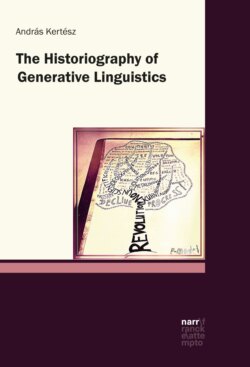Читать книгу The Historiography of Generative Linguistics - András Kertész - Страница 37
На сайте Литреса книга снята с продажи.
2.6 Digression: ChomskyChomsky, Noam’s self-assessment
ОглавлениеChomskyChomsky, Noam evaluated his own work in many interviews.1 His answers to the questions raised cannot be treated as a historiographicalhistoriography achievement; however, it may be instructive to reflect on them, as they contribute to our understanding of the historiographical standpoints surveyed in the present book.
Although, according to MurrayMurray, Stephen O. (1994: 244, footnote 20; 246, footnote 22; 1989: 154) and KoernerKoerner, E.F. Konrad (2004: 51), ChomskyChomsky, Noam did not use the word ›revolution‹ to characterize his own theories, from some of his statements we may infer that he considers the Theory of Government and BindingGovernment and Binding, Theory of (Chomsky 1981) – or as it was later called, the Theory of Principles and ParametersPrinciples and Parameters, Theory of (Chomsky & LasnikLasnik, Howard 1993) – revolutionaryrevolutionary.
On the one hand, it is interesting to compare the arguments for the KuhnianKuhnian revolutionrevolutionKuhnianaryrevolutionary nature of Syntactic StructuresSyntactic Structures (see Section 2.1.1) with the way in which ChomskyChomsky, Noam, in the interview he gave to Riny Huybregts and Henk van RiemsdijkRiemsdijk, Henk in 1979, rejects the statement that the first 25 years of generative linguistics can be considered a Kuhnian revolution, because KuhnKuhn, Thomas S.’s work »is wildly misused outside the natural sciencesciencenaturals« (Chomsky 2004: 66). He continues as follows:
So I think that KuhnKuhn, Thomas S.’s notions do not really apply outside the fields in which really significant intellectual progressprogress takes place. […] I just do not think that linguistics has undergone any kind of intellectual revolutionrevolutionintellectual (ChomskyChomsky, Noam 2004: 66).
He interprets early generative linguistics as a refinement – and not as a radical replacement – of the method of neo-Bloomfieldianneo-BloomfieldianBloomfieldian structuralismstructuralism:
[…] it was very striking to me when transformationaltransformation grammargrammar first gained a certain small degree of popularity in the early 60s, to notice that primarily it was just used as another descriptive device. There are things that you can describe in that way more easily than in terms of constituent structure, but that is not a fundamental conceptual change […] ChomskyChomsky, Noam (2004: 66; emphasis added).
He adds that »all of this work of the past twenty-five years [relative to 1979] is preliminary to a future conceptual revolution which I think we can begin to speculate about the vague outlines of« (ChomskyChomsky, Noam 2004: 67; emphasis added). In rejecting the revolutionaryrevolutionary nature of his early work, Chomsky contradicts those of his followers who continue to assert the revolutionary nature of Syntactic StructuresSyntactic Structures, while, in this respect, he seems to share the standpoint of those publications that at the outset rejected the idea that Syntactic Structures was revolutionary (HymesHymes, Dell & FoughtFought, John 1982, MurrayMurray, Stephen O. 1994, KoernerKoerner, E.F. Konrad 1989, 2002, 2004, HarrisHarris, Randy Allen 1993, etc.). The above quotations are noteworthy in yet another respect. Interestingly enough, while the quotation maintains that in Chomsky’s view his early work was not revolutionary, this claim refers to the very phase of his professional career in which – according to Murray, LakoffLakoff, Robin, Harris and others – Chomsky applied revolutionary rhetoricrhetoric as his most important weapon in the generativist war against the neo-Bloomfieldianneo-Bloomfieldians.
On the other hand, in an interview by GrewendorfGrewendorf, Günther he mentioned the Theory of Principles and ParametersPrinciples and Parameters, Theory of without, however, referring to KuhnKuhn, Thomas S., when he was asked which phase of generative linguistics he found revolutionaryrevolutionary (Grewendorf 1994: 293). ChomskyChomsky, Noam (2002a: 95) describes the significance of the Theory of Government and BindingGovernment and Binding, Theory of – which was explained systematically in lectures he gave in Pisa and later published as Chomsky (1981) – using expressions which might remind one of the usual characterization of the Copernican Revolution:2
The whole historyhistory of the subject, for thousands of years, had been a history of rules and constructions, and transformationaltransformation grammargrammar in the early days, generative grammar, just took it over. So the early generative grammar had a very traditional flair. […] What happened in the Pisa discussion was that the whole framework was turned upside down. […] the way of looking at things was totally different from anything that had come before, and it opened the way to an enormous explosion of research in all sorts of areas, typologically very varied. […] In fact I think it is fair to say that more has been learned about languagelanguage in the last twenty years than in the preceding 2000 years (ChomskyChomsky, Noam 2002a: 95; emphasis added).3
Nevertheless, even in this context he does not use the term ›revolution‹. Nor does he assume the revolutionaryrevolutionary nature of the Minimalist ProgramMinimalist Program. In a lecture he remarked: »My feeling about linguistics is that we’re in a pre-GalileanGalilean stage. Maybe there will come a scientificscientific revolutionrevolutionscientific, but we are still struggling towards it« (ChomskyChomsky, Noam 2011).
